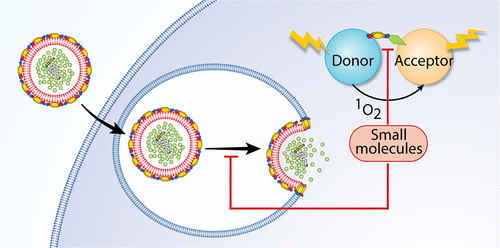当前位置:
X-MOL 学术
›
ACS Infect. Dis.
›
论文详情
Our official English website, www.x-mol.net, welcomes your feedback! (Note: you will need to create a separate account there.)
Discovery of Immunologically Inspired Small Molecules That Target the Viral Envelope Protein
ACS Infectious Diseases ( IF 5.3 ) Pub Date : 2018-07-20 00:00:00 , DOI: 10.1021/acsinfecdis.8b00127 Wenlong Lian 1 , Jaebong Jang 2 , Supanee Potisopon 1 , Pi-Chun Li 2 , Amal Rahmeh 1 , Jinhua Wang 2 , Nicholas P. Kwiatkowski 2 , Nathanael S. Gray 2 , Priscilla L. Yang 1
ACS Infectious Diseases ( IF 5.3 ) Pub Date : 2018-07-20 00:00:00 , DOI: 10.1021/acsinfecdis.8b00127 Wenlong Lian 1 , Jaebong Jang 2 , Supanee Potisopon 1 , Pi-Chun Li 2 , Amal Rahmeh 1 , Jinhua Wang 2 , Nicholas P. Kwiatkowski 2 , Nathanael S. Gray 2 , Priscilla L. Yang 1
Affiliation

|
Dengue virus is a major human pathogen that infects over 390 million people annually leading to approximately 500 000 hospitalizations due to severe dengue. Since the only marketed vaccine, Dengvaxia, has recently been shown to increase disease severity in those lacking natural immunity, antivirals to prevent or treat dengue infection represent a large, unmet medical need. Small molecules that target the dengue virus envelope protein, E, on the surface of the virion could act analogously to antibodies by engaging E extracellularly to block infection; however, a shortage of target-based assays suitable for screening and medicinal chemistry studies has limited efforts in this area. Here we demonstrate that the dengue E protein offers a tractable drug target for preventing dengue infection by developing a target-based assay using a recombinantly expressed dengue serotype 2 E protein. We performed a high-throughput screen of ∼20 000 compounds followed by secondary assays to confirm target-binding and antiviral activity and counter-screens to exclude compounds with nonspecific activities. These efforts yielded eight distinct chemical leads that inhibit dengue infection by binding to E and preventing E-mediated membrane fusion with potencies equal to or greater than previously described small molecule inhibitors of E. We show that a subset of these compounds inhibit viruses representative of the other three dengue serotypes and Zika virus. This work provides tools for discovery and optimization of direct-acting antivirals against dengue E and shows that this approach may be useful in developing antivirals with broad-spectrum activity against other flavivirus pathogens.
中文翻译:

发现针对病毒包膜蛋白的免疫学启发的小分子
登革热病毒是一种主要的人类病原体,每年感染超过3.9亿人,由于严重的登革热导致大约50万人住院。由于最近已显示出唯一上市的疫苗Dengvaxia在缺乏自然免疫力的人群中会增加疾病的严重程度,因此用于预防或治疗登革热感染的抗病毒药物代表了巨大且尚未得到满足的医疗需求。在病毒粒子表面靶向登革热病毒包膜蛋白E的小分子可以通过在细胞外与E结合来阻止感染,从而类似于抗体。然而,适用于筛选和药物化学研究的基于靶标的检测方法的缺乏限制了该领域的努力。在这里,我们证明了登革热E蛋白通过开发使用重组表达的登革热血清型2 E蛋白的基于靶标的检测方法,为预防登革热感染提供了一种易于治疗的药物靶标。我们对约20000种化合物进行了高通量筛选,然后进行了二次测定以确认靶标结合和抗病毒活性,并进行反向筛选以排除具有非特异性活性的化合物。这些努力产生了八个不同的化学线索,这些化学线索通过与E结合并防止E介导的膜融合而抑制登革热感染,其效力等于或大于先前描述的E小分子抑制剂。我们证明了这些化合物的一部分可抑制代表E的病毒。其他三种登革热血清型和寨卡病毒。
更新日期:2018-07-20
中文翻译:

发现针对病毒包膜蛋白的免疫学启发的小分子
登革热病毒是一种主要的人类病原体,每年感染超过3.9亿人,由于严重的登革热导致大约50万人住院。由于最近已显示出唯一上市的疫苗Dengvaxia在缺乏自然免疫力的人群中会增加疾病的严重程度,因此用于预防或治疗登革热感染的抗病毒药物代表了巨大且尚未得到满足的医疗需求。在病毒粒子表面靶向登革热病毒包膜蛋白E的小分子可以通过在细胞外与E结合来阻止感染,从而类似于抗体。然而,适用于筛选和药物化学研究的基于靶标的检测方法的缺乏限制了该领域的努力。在这里,我们证明了登革热E蛋白通过开发使用重组表达的登革热血清型2 E蛋白的基于靶标的检测方法,为预防登革热感染提供了一种易于治疗的药物靶标。我们对约20000种化合物进行了高通量筛选,然后进行了二次测定以确认靶标结合和抗病毒活性,并进行反向筛选以排除具有非特异性活性的化合物。这些努力产生了八个不同的化学线索,这些化学线索通过与E结合并防止E介导的膜融合而抑制登革热感染,其效力等于或大于先前描述的E小分子抑制剂。我们证明了这些化合物的一部分可抑制代表E的病毒。其他三种登革热血清型和寨卡病毒。



























 京公网安备 11010802027423号
京公网安备 11010802027423号